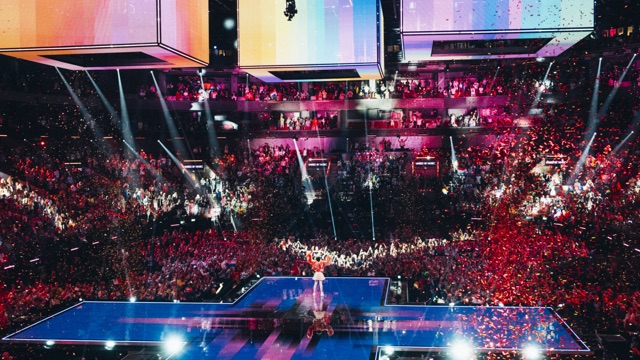Several artists and delegations at the Eurovision Song Contest 2024 have confirmed they reported multiple concerns to the EBU during the rehearsals and live shows in Malmö; including delegations from the Netherlands, Ireland, Portugal, Spain, Switzerland, and the United Kingdom.
Concerns have also been raised publicly throughout the media, and various activities have been cited that made members of the press feel unsafe while covering Malmö 2024. Several incidents were reported to the EBU during the week, including harassment of journalists, the recording of private conversations without consent, and some incidents potentially breaking Swedish law.
Since these are still being investigated, it would be wrong to comment on them directly. But there is a wider point to be raised. No matter the results of these investigations, there is a perception that the Eurovision Song Contest is an unsafe working environment for artists, delegations, and those covering the Contest.

Eurovision stage design for Malmo 2024 (EBU / SVT)
From our perspective in the press room, this leads us to worry about the potential for independent voices in the future. Will the next generation of community media feel safe voicing strong opinions about the songs and the Contest? Will specialist media feel confident they can report and investigate issues raised during their coverage? Will large organisations, including delegations, feel comfortable putting their own people in the press centre?
The answer to these questions might lie within the Junior Eurovision Song Contest.
Junior Eurovision’s Safeguarding Policy
Junior Eurovision 2023 introduced the EBU’s Child Protection and Safeguarding Policy (you can read it in full here), and everyone accredited to the Contest in any capacity had to adhere to it.
Insight’s Ben Robertson examined the policy in detail as part of our Nice 2023 coverage, highlighting the aims of the policy:
- Be informed and aware of what constitutes abuse.
- Know how to recognise abuse.
- Understand what they are required to do should they have any concern for the welfare of a child.
The policy is clear that it is better to report than to not do so.
There is a specifically named Junior Eurovision Safeguarding Manager who is the point of contact for questions and referrals from anyone with concerns about anyone else. Their role includes maintaining confidential records and following up on each case. The policy also details who to approach for advice and who must be informed if police or child protection agencies need to be called in (specifically, in addition to the Junior Eurovision Safeguarding Manager, the EBU Safeguarding Managers are the Executive Supervisor, the Chairperson of the Junior Eurovision Steering Group, and the EBU Deputy Director General/Director Media).
This policy not only allayed concerns about child welfare raised by some broadcasters but also offered a clear route for reporting issues, what would happen with these reports, and how they would be escalated.
The Junior Eurovision Policy is only a starting point; it does not address what would happen if the concerns being raised were about those who are named in the Policy or about organisational issues within the EBU. An external ombudsman would be one area to consider when building up an appropriate policy for May.

The Malmö stage for Eurovision 2024 (Photo: EBU / Sarah Lousie Bennett)
A Safeguarding Policy For May
As part of this article, I spoke to Gabe Milne (better known in these circles as @ESC_Gabe) and what happened after he raised his concerns to the EBU in Malmö:
“I reported the harassment faced by artists and press to the EBU on the Friday of Eurovision week in writing, having been directed to do so by EBU representatives in the press centre after raising my concerns in person. I chased a response on Saturday, 11th May. To date [May 21st], I’ve still not received any response from the EBU.”
Thanks to the Junior Eurovision Safeguarding Policy, the EBU has a model that it can introduce and tailor for the Eurovision Song Contest if it wishes.
I would urge it to introduce and announce this policy as soon as possible, as this will begin to build up confidence in the system for those who attend future Song Contests.
It would show that issues raised by many in Malmö have been heard and have been taken on board. It would offer a framework on reporting issues and a visible process on what happened with these reports going forward. And it offers tools for those overseeing Safeguarding to spot patterns through individual reports, allowing them to take action where required.

Eurovision Art Installation in Malmo (Photo: Ewan Spence)
Rebuilding Confidence
Following the Song Contest, the EBU offered a statement to The Irish Times, which included the following section:
“The EBU’s governing bodies will, together with the heads of delegations, review the events surrounding the ESC in Malmö to move forward in a positive way and to ensure the values of the event are respected by everyone.
“Individual cases will be discussed by the event’s governing body, the Eurovision Song Contest Reference Group made up of representatives from participating broadcasters, at its next meeting.”
I would question if the Reference Group, which only meets a handful of times throughout the year, is an appropriate forum for these investigations. Regardless of the outcome of the investigation and any potential legal actions that may occur in the future, there needs to be confidence in a system for reporting issues at the Contest.
Having a publicly acknowledged and transparent safeguarding policy that can be used by anyone involved in the Contest—be they media, performers, delegation members, riggers, chefs, volunteers, or any of the hundreds of roles needed to run the Contest—and that will allow action to be taken immediately, would be a positive step to build on what happened in Malmö.
It is not the only step that must be taken, but it is one immediate step that can be taken today as the EBU looks to enact larger changes.










I think what is needed above all is to simplify the contest. Let’s reduce the workload which is causes these stresses and strains. Is it really necessary to have six rehearsals (two individual, two ‘family’ semis, one evening preview semi, one family grand final? Plus a jury final and a grand final? Too much is being expected of artists on top of the sort of demands which apparently sent Joost Klein over the edge. Poor Baby Lasagna was already exhausted by the time of the Turquoise carpet, we know because that’s what he said there.
A limit should be set on prop complexity, and jury finals should be eliminated altogether. Let them vote on what we all see and don’t force singers to peak twice. I know producers want to know jury results before the Grand Final but artists should come first. Today’s technology should allow that.
I agree with comments to simplify the contest. Do we really need all those press conferences? It seems as if the artists are asked the same inane questions over and again and they look exhausted.
Do we really need backstage content of any kind? It seems most of the contention was backstage with filming when it wasn’t wanted. Do we as fans need this kind of contest? As an audience we seem to be demanding more than we are entitled too. I remember just being excited to listen to all the songs on youtube before the contest. We have already cut back on rehearsal footage time to reconsider again.
I recall when Sweden was hosting in 2013 there was a desire to simplify the contest and that doesn’t seem to have happened. There must be a way costs can be reduced to make entry more realistic to countries like Bulgaria, Bosnia, Romania and North Macedonia. Looking at the rest of the world vote breakdown it seems there is a hunger in these countries to be competing still.
I must say the flag parade and the post cards do connect the audience with the contestants which is an improvement over the contests of the 00s. But does the interval need to be so long? Why does the televote window have to be so long? If you can vote 20 times that can be done very quickly. I know that it might take a while for technology to receive the votes in time but we really can shave 30 minutes off the show. I thought the idea of presenting the Jury votes was in part that the televotes could be counted in this time but it seems to be dragged out.